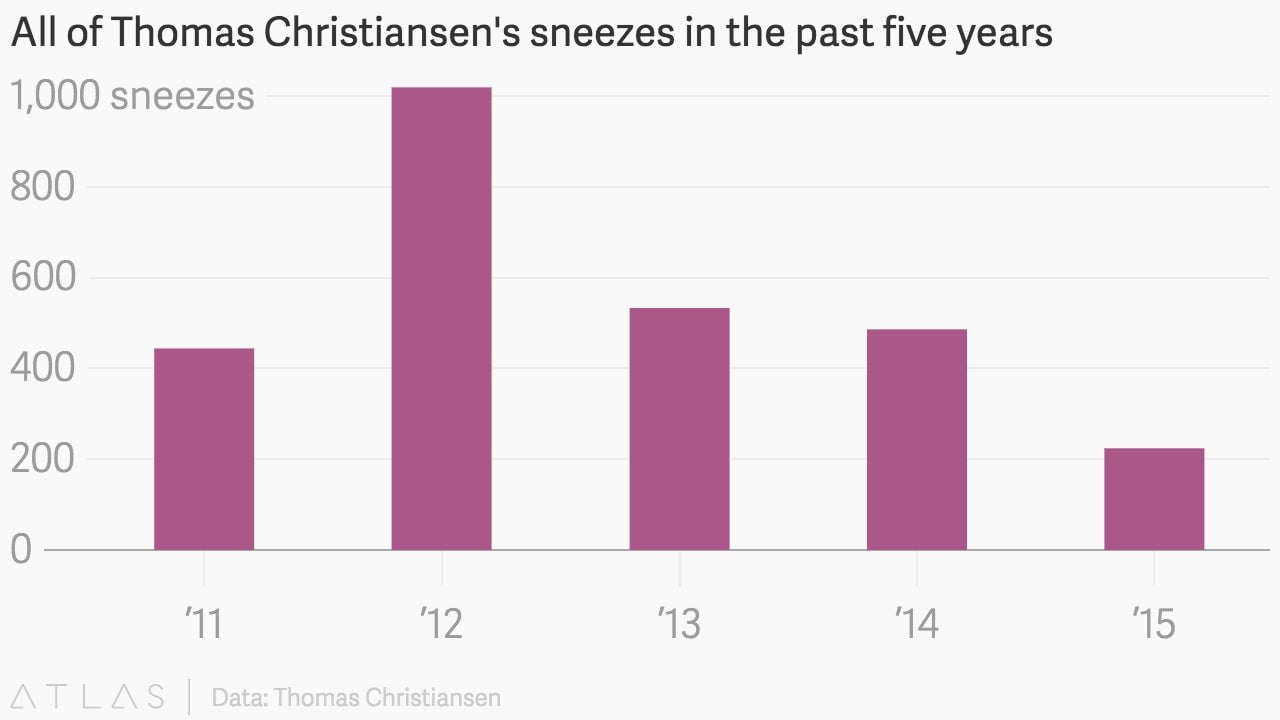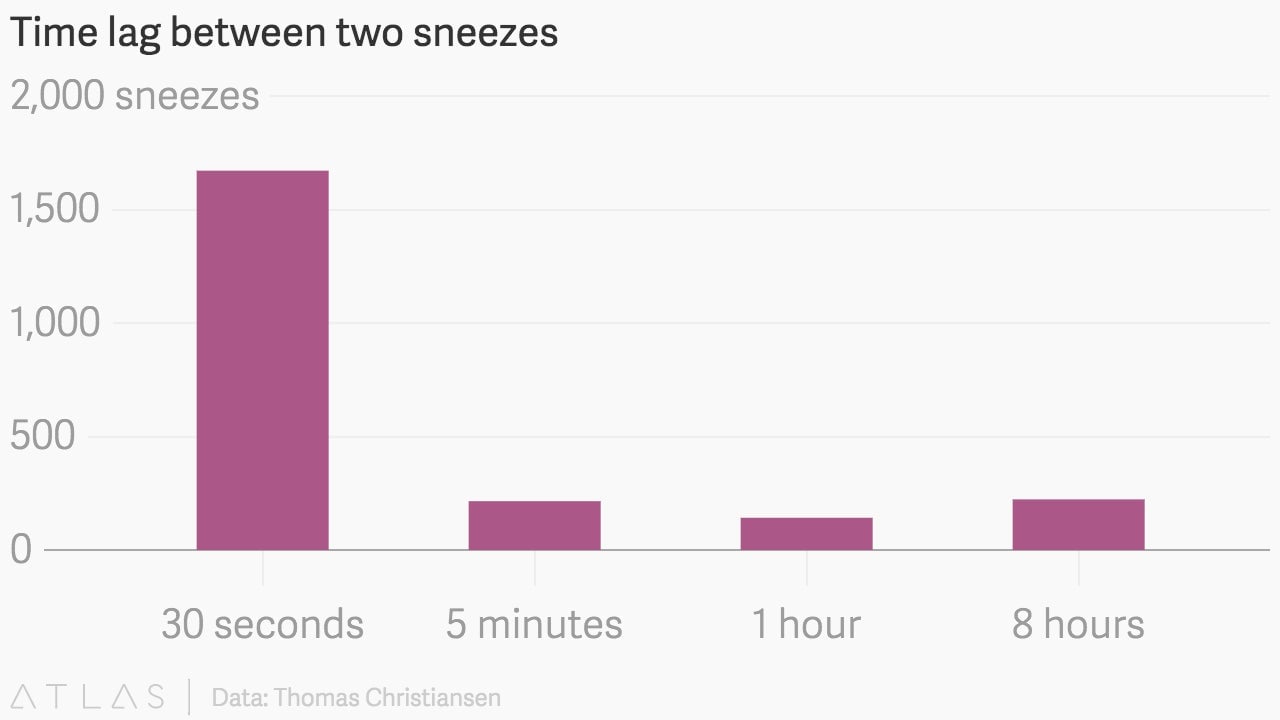A man who tracked five years of sneezes might have a fix for your pollen allergy
Thomas Blomseth Christiansen is not an ordinary geek. For the last five years he has been tracking everyday things about his life—from steps to sneezes. He now has more than 100,000 data points, and he has used them to improve his health. After many minor, and some major, changes to his lifestyle, he’s nearly gotten rid of his allergy to pollen.


Thomas Blomseth Christiansen is not an ordinary geek. For the last five years he has been tracking everyday things about his life—from steps to sneezes. He now has more than 100,000 data points, and he has used them to improve his health. After many minor, and some major, changes to his lifestyle, he’s nearly gotten rid of his allergy to pollen.

When I met Christiansen, at the Quantified Self conference in Amsterdam, he was eager to tell me how much better his life was this summer compared to any summer in the last five years. He’s one of a growing wave of people convinced that documenting life’s minutiae can yield powerful benefits.
At least in Christiansen’s case, there’s already scientific work that might go some way to explain the success he achieved. “The experience of this guy is what immunotherapy looks like,” Roy Kennedy, professor of aerobiology and microbial science at the University of Worcester, told Quartz.
The allergy conundrum
Christiansen suffers from a pollen allergy, just as many millions around the world do. The World Health Organization estimates (pdf) that nearly 40% of the world’s population has been affected by some allergy, and a quarter suffer from pollinosis.
Despite decades of work, scientists still can’t agree on why we suffer from allergies. The leading theory is that allergies are a misfiring of the immune system. Substances that cause allergic reactions have molecular structures that mimic proteins found in parasitic worms. Because parasitic worms can be deadly, the body has developed strong responses to fight anything similar to it.
The common treatment for most allergies, anti-histamines, reduce the inflammation caused by the immune system’s reaction to the allergen but also have side effects.
When on the drugs, Christiansen was suffering from drowsiness and lethargy, which are common. But he was also suffering from eczema and some gut problems, which may have become worse because of the allergy (or vice versa).
So he decided to take matters in his own hands.
As a software programmer, Christiansen thought that if he was going to spend so much time tracking his own health, he might as well develop tools that others could use.
By 2011 he had developed the Mymee app, which makes it easy to note all the self-tracking data on your mobile in one app. Christiansen was tracking food, sleep, drinks, sneezes, supplements, tiredness level, waistline size, and more. His hope was that the data would enable him to do experiments and see whether any modification to his lifestyle would help improve his health.
When he started in 2011, the data were a clear confirmation that he was suffering from pollen allergy: almost all the sneezing happened during the summer, when pollen concentration is higher. Before then, he had stopped drinking alcohol and also given up certain foods that he suspected were making his symptoms worse.
However, those decisions were based on instinct and not data. So in 2012, he decided to start eating foods that he had given up, such as dairy products and gluten.
The 2012 data then showed what he had suspected: those foodstuffs and drinks indeed made him more sensitive to allergies. The sneezing doubled, and he noticed that he was feeling drowsy even without the drugs. So in 2013, he went back on a strict diet, and almost like a switch the sneezing went down to 2011 levels.
There were other unexpected insights from all the data he had gathered. He noticed, for instance, that the gap between two sneezes was never more than a few minutes. And such sneezing always occurred in clusters, rather than evenly spread out through the pollen season. That observation made him think that his body was trying to expel the pollen as soon as it could.

Finding a fix
The leading theory of allergy says that allergens are harmless, yet the body treats them otherwise. An alternate theory, one put forth by Ruslan Medzhitov of Yale School of Medicine in 2012, is that perhaps allergens are actually harmful to the body and allergic reactions provide an evolutionary advantage. This is in line with the conclusion Christiansen came to independently.
“The observations here agree with my theory of allergies,” Medzhitov told Quartz. “The clustered sneezes are a reaction to expel the pollen, because the body thinks it’s harmful. Though we can’t show yet that pollen can harm the body, it might be like the case of tobacco where we had to wait decades before we could detect that smoking caused cancer.”
Medzhitov thinks that allergies are like pain: neither too little nor too much is useful, but, without it, our lives could be disastrous. That’s why preventing the immune system from reacting to allergies, which modern medicine is moving toward, may turn out to be a bad idea.
Medzhitov’s thesis made intuitive sense to Christiansen when he read about it. So, he approached his allergy with two aims: reduce exposure to pollen and raise resistance to it.
Achieving the first goal was relatively easy. He began nasal rinsing—a technique where water is poured through one nostril and excreted from the other. This ensured that his nasal passage was clear, and there was no build up of pollen.
Because he was also tracking the location of his sneezes, he realized that in the US, where he traveled frequently in the summer for work, the allergic reaction was much less severe. It was the pollen in Denmark, his home country, that caused the most trouble. More specifically, it was his home in Denmark, more than any other place in the country, that caused his allergy to flare (even if he accounted for time spent in each location). So he sold his flat and bought a new one in the same city.
The second goal was trickier. Apart from giving up certain foods, the only other thing that seemed to help defend against allergies was drinking water. (There is some evidence that levels of hydration can affect mucosal immunity.)
All these changes made a huge impact. This year, the pollen season is nearly over and Christiansen has sneezed only 225 times, which is one-fourth of his total in 2012. He also feels healthier today at the age of 41 then he did a decade ago when then problems began.
“I am now asymptomatic,” Christiansen told Quartz. “This summer, for the first time in my life, I cut grass at my parents’ cabin and I did not sneeze even once. My system’s tolerance for pollen has gone up so dramatically that I’m able to do things that couldn’t dream of.”
N = 1
Although Christiansen’s data-driven experiment has only one biased subject, immunotherapy might explain the success he achieved.
The idea behind immunotherapy as a treatment for allergies is to expose the person to very small doses of the allergen that triggers an allergic response. Someone like Christiansen who suffers from allergy to grass pollen, Kennedy said, would be prescribed Grazax in the UK. The tablet contains a tiny dose of the grass pollen, which provides a signal to the immune system without triggering a full-blown reaction.
“For those who suffer from severe allergies, immunotherapy would last many years,” Kennedy said. “Optimally, at least five years.”
Is it a coincidence that it is the amount of time Christiansen has been doing his own self-tracking experiment? “Probably not,” Kennedy said. “It might be that the steps he took reduced his exposure to pollen to the levels recommended in immunotherapy.”
And there is more that science might be able explain. “He also seems to have acted on secondary factors,” Kennedy said. “Alcohol and smoking, for instance, are known to disrupt the body’s working in ways which often exacerbate allergic reactions.
What about his observation that water helps keep the allergy at bay? Kennedy said, “Dehydration can, too, disrupt working at the cellular level which may make the person more susceptible to allergies.”
Derek Sant’Angelo, an immunologist at Rutgers University, told Quartz that he found the experiment interesting. But he warned that the results cannot be generalized. Even though pollen have been recognized as one of the most common sources of allergies, we still don’t understand why some people’s body’s react to it the way they do.
Worse still, as is clear from Christiansen’s case, every person’s allergy is unique. Lots of factors contribute to causing an allergic reaction. The factors that Christiansen has managed to bring under control might not be the same for another person.
“There is no harm in people who suffer from allergy to try what Christiansen has tried,” Kennedy said. Or, if you are ready to wait, Medzhitov’s work might help you find a fix for your particular allergy.